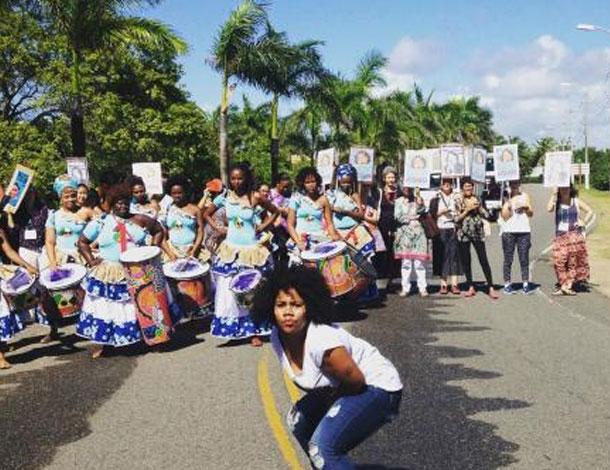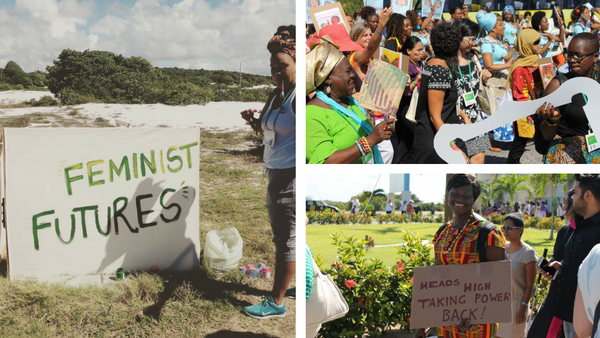The AWID Forum was a time for celebration, reflection and creativity.
That’s what you get when some 1800 feminists get together. But amidst the energy, the inspiration and the sleep deprivation, a serious process also took place. One aimed at acknowledging our differences, supporting our intersectionalities, and creating a collective vision for the feminist world we want to see take form.

Since being back, I’ve done a lot of thinking about what I really took away from the Forum: what marked me, what stuck with me, what made me engage in constructive self-reflection. Here are a few things I want to share:
First of all: We are no movement(s) without knowing ourselves.
The Forum was an important and timely opportunity to put faces to names, but also to hear the voices of those who should be considered new influencers within our movements. Not new because of the newness of their struggles or mobilization, but new in the sense of the space they have to make noise and be heard. Hearing from our transgender sisters and brothers on struggling to find a place at the women’s rights movement table, was important to understand how far we have come. Hearing our afro-feminist sisters’ declaration loud and clear added a foundational pillar to our global home. Hearing our sisters with disabilities remind us of our responsibility to walk the talk of inclusion of people living with disabilities in our priorities and struggles, opened doors of self-reflection on our own work and inclusion strategies. Hearing our sisters from the indigenous movement reaffirm values and strategies they have been using for decades in the fight against climate change was a key barometer of prioritizing as we move into a new decade of global commitments and strategies. From the Paris Agreement to the SDGs - there is a whole lot of commitment out there but little action.
Secondly: Intersectionality is not an end in itself but rather a process.
The Forum was a crucial moment to discuss and map out what that word even means. Intersectionality is used in many ways, so what comes out of it when it is put through a feminist lens? It is certainly more than integration or collaboration. Intersectionality means that there is no feminist truth without all truths represented. It means recognizing that there is no single oppression, but there are many, and they intersect. It means celebrating our umbrella values and beliefs while supporting and strengthening our diverse movements under and within them. What I learned and heard from other participants was that intersectional feminism should be a process that we (feminists) control. Meaning that we need to co-create our own internal collaborations within our movements to ensure that all voices are represented and feed into our common agenda. If not, we will just replicate structures of oppressions that are present in our communities and societies. Our feminist village needs to exist within and among us before being mainstreamed outside.
Thirdly: Self-care is not a luxury; it is key to our success.
We do not get to transform this world into a feminist one without caring for ourselves. Women human rights defenders, gender equality advocates, and feminists are often ostracized and stigmatized by their communities, families and governments. All struggle to find their place in patriarchal social systems and structures. Some members of our movements step out of their homes every day not knowing if they will make it home that night: they are emotionally and physically threatened, attacked, imprisoned and sometimes killed. And while we are good at showing and acting in solidarity, we often forget to encourage self-care, both for others and ourselves. The Forum enabled us to explore what self-care means, and how we can turn it into a feminist mantra. In a time when self-care is yet another buzzword, how do we embody the values and spirit of feminist self-care in our families and communities? One of the plenary panelists reminded us that “caring for ourselves is a strategy to our collective liberation”. Another urged us not to only take an individualistic approach to self-care, but to strengthen and embrace communities of care. To not focus on self-care as a moment but rather as a continuum of exchanges, attitudes and support mechanisms.

Overall, the AWID Forum enabled us to assess our strengths and our weaknesses. And even though I walked away with questions as to how we could turn our collective values into an agenda for global change, I also walked away with the absolute conviction that feminist movements –as represented at the Forum- are going to be key players in the social, political, economic and cultural changes ahead of us.
Why do I know this? Because we are more diverse than ever before; and that diversity will only multiply our power. We are also movements with spectacular cross-generational leadership; and that matters incredibly in terms of our capacity to influence and mobilize.
